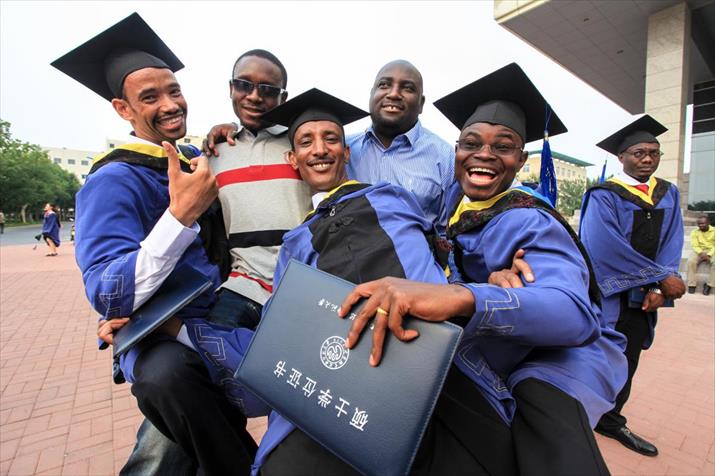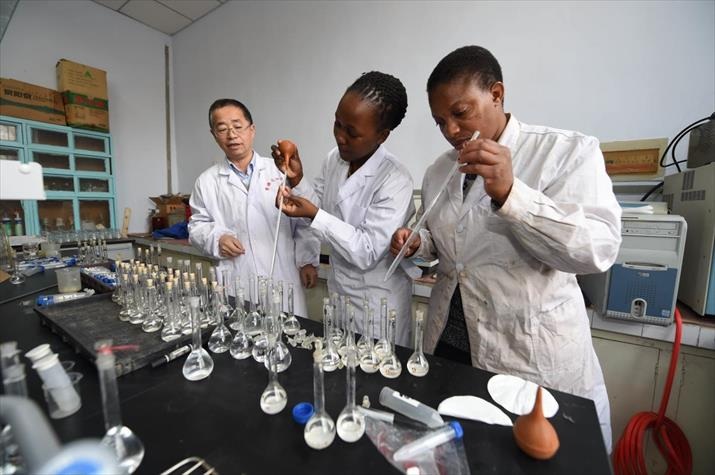|
||||||||||
| Home Nation World Business Opinion Lifestyle ChinAfrica Multimedia Columnists Documents Special Reports |
|
||||||||||
| Home Nation World Business Opinion Lifestyle ChinAfrica Multimedia Columnists Documents Special Reports |
| China |
| Brain Gain |
| Partnership between higher education institutions is the key to ensuring that Africa has the skilled workforce it needs to compete |
| By Hou Weili | VOL.9 August 2017 ·2017-08-03 |

OLATUNJI Mumini Omisore, a Ph.D student of Medical Robotics at the University of Chinese Academy of Sciences (UCAS) in Beijing, has big plans for his future. But one thing is for sure: He will go back to his home country of Nigeria to advance the application of robotics in healthcare.
"By applying sciences in real life, I can make a difference in people's life," the young man told ChinAfrica.
For Africa, skilled professionals and technicians like Omisore are the backbone to realizing the continent's vision of development and integration. The good news is that both China and Africa are realizing the importance of tapping the potential of human resources as bilateral cooperation advances, and joining force with international organizations to achieve this common goal.
On July 10, the First China-Africa-World Bank Education Partnership Forum kicked off in Beijing, demonstrating how tripartite partnerships can help develop human resources in Africa. Gathering policy makers and faculty members of leading universities and research institutions from China and African countries, the forum provided a platform for both sides to forge new partnerships on education exchanges, especially in areas of agriculture, renewable energy, information and communication technology (ICT), healthcare and railway.
Skilled workforce needed
Although still struggling with poverty, Sub-Saharan Africa has experienced remarkable progress over the past few years. According to a recent report by the World Bank, the region's economic growth is recovering and is expected to pick up to 2.6 percent in 2017 after the most drastic plummet of the past two decades in 2016.
Africa is also the world's youngest continent, with more than 60 percent of its population under the age of 25. "Because of this, we believe in the great promise of Africa," said Liang Xiaoyan, a senior education specialist at the World Bank, speaking at the forum.
"The incoming foreign investment in Africa, including Chinese investment, is boosting the demand for a skilled workforce to manage and maintain newly developed infrastructure and services," she noted.
In 2015, the AU adopted its Agenda 2063 as a long-term action plan to realize the vision of transforming Africa into an integrated, prosperous and peaceful continent within 50 years. The demographic dividend of such a large population of young people can be an asset in achieving the goal of realizing prosperity and peace.
"African countries have come to realize that they will become competitive only to the extent that they embrace the knowledge economy," said Mohammed Salifu, Executive Secretary of Ghana's National Council for Tertiary Education.
However, there is a large gap between the demand and supply of skilled people required for Africa's current labor market, let alone for the future. According to a recent survey conducted by the World Bank, 19 percent of firms surveyed in Sub-Saharan Africa consider the inadequately educated workforce as a major constraint, and over 27 percent of production workers are rated as unskilled workers.
"The key challenge was and remains the training of Africans to supply the emerging new economy, while maintaining access to education and ensuring quality outputs in research," Salifu noted.

Pooling efforts
In this regard, partnerships with BRICS countries, especially China, can help alleviate the problem. "How to improve the quality of higher education, foster technological innovation and commercialize scientific results are among the main problems to solve," Aminata Diallo, Advisor to Senegal's Ministry of National Education, pointed out at the forum.
China has been emerging from its own set of socio-economic challenges. With the nation's higher education system rising in global rankings, significant advances have been made in cutting-edge science and technology by Chinese institutions and private sector in areas such as agriculture, renewable energy, ICT, as well as railway technology.
"To accelerate its economic growth, Africa could potentially benefit from learning the approaches, methods and strategies used by China's higher education sector to develop science and technology," noted Bai Chunli, President of UCAS.
UCAS has made supporting African students' pursuit of science research one of its priorities by partnering with international organizations. In 2013, Chinese Academy of Sciences (CAS) and The World Academy of Sciences (TWAS) funded the CAS-TWAS President's Fellowship Program to provide students from developing countries a chance to pursue Ph.D degrees at UCAS and CAS institutions around China.
"The fellowship program offers a monthly stipend of about 8,000 yuan ($1,179) and covers international travel as well," said Omisore, who will study at UCAS for four years.
Currently, a total of 251 students from 24 African countries study at UCAS, according to Su Gang, Vice President of UCAS.
More tripartite partnerships on higher education between China, Africa and the World Bank have been established with support from the Chinese Government. Leading Chinese research institutions and private companies are working with African counterparts to develop joint programs and promote exchanges.
Five center of excellence organized CAS and TWAS are offering a remarkable opportunity for researchers from the developing world to study, train and work in Beijing-based laboratories.
Besides the CAS-TWAS centers of excellence and overseas research bases established by CAS, Southwest Jiaotong University in Chengdu, Sichuan Province, and Shanghai Jiao Tong University are cultivating partnerships with the Center of Railway Engineering at University of Addis Ababa, in Ethiopia.
The World Bank also supports 46 centers of excellence across 15 African countries with an aim at strengthening their capacities to deliver high-quality market-relevant postgraduate education, and build collaborative research capacity in areas of science and technology.
"These partnerships will collectively produce a large number of high-end talents and skilled people and have a much-needed uplifting effect on the rest of the higher education system in the region," Liang noted.
| About Us | Contact Us | Advertise with Us | Subscribe |
| Copyright Beijing Review All rights reserved 京ICP备08005356号-5 京公网安备110102005860号 |